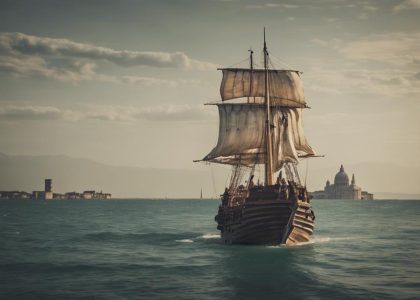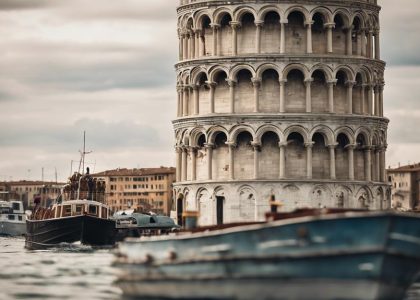Pisa's involvement in maritime conflicts during the medieval period stemmed from a complex interplay of factors that shaped the city-state's strategic decisions. The allure of controlling key trade routes in the Mediterranean, coupled with the rivalries with other maritime powers, fueled Pisa's ambitions on the open seas. However, beneath the surface of these conflicts lay deeper motivations that reveal a nuanced understanding of Pisa's geopolitical ambitions and economic interests. By examining the historical context surrounding Pisa's maritime endeavors, a clearer picture emerges of the driving forces behind its willingness to engage in naval confrontations.
Historical Background of Pisa's Maritime Power

Pisa's ascendancy as a maritime powerhouse can be traced back to its strategic location and early mastery of naval technologies. Situated along the western coast of Italy, Pisa enjoyed access to both the Mediterranean Sea and major inland waterways, providing ample opportunities for trade and expansion. The city's early adoption of advanced naval technologies, such as improved ship designs and navigation methods, further bolstered its maritime capabilities.
With these advantages, Pisa quickly rose to prominence as a dominant force in the Mediterranean during the 11th and 12th centuries. The city's fleets controlled key trade routes, facilitating the exchange of goods, ideas, and cultures across the region. Pisa's naval prowess not only secured its economic prosperity but also enhanced its political influence, allowing the city-state to establish colonies and forge alliances with other maritime powers.
As Pisa's maritime power grew, so did its ambitions, leading to conflicts with rival republics and kingdoms vying for control of the seas. These rivalries would ultimately shape the course of Pisa's history and contribute to its eventual decline as a maritime power.
Rivalries With Other Maritime Republics

Amidst its maritime ascendancy, Pisa found itself entangled in fierce rivalries with other prominent maritime republics seeking dominance over the Mediterranean trade routes. The most notable rivals of Pisa during this period were Genoa, Venice, and Amalfi. These city-states vied for control over key trading ports, lucrative commercial routes, and strategic naval outposts, leading to frequent clashes and conflicts in the waters of the Mediterranean.
Genoa, known for its maritime prowess and formidable navy, posed a significant challenge to Pisa's ambitions of expanding its influence across the region. Venice, with its powerful fleet and extensive trading networks, also emerged as a formidable competitor, often engaging in fierce competition with Pisa for control over vital trade routes and markets. Additionally, the maritime republic of Amalfi, although smaller in size compared to Pisa, played a significant role in the rivalry for maritime dominance.
These rivalries not only fueled a sense of competition and rivalry among the maritime republics but also shaped the geopolitical landscape of the Mediterranean during this era of intense maritime conflict.
Economic Importance of Naval Dominance

Naval dominance in the Mediterranean region played a pivotal role in shaping the economic landscape of the maritime republics during this era of intense competition. Control over the seas meant control over vital trade routes, allowing maritime republics like Pisa to secure lucrative trade agreements, establish prosperous commercial networks, and expand their economic influence far beyond their borders. The ability to protect merchant vessels from piracy and secure safe passage for goods was essential for maintaining a thriving economy.
Naval dominance not only facilitated trade but also provided a strategic advantage in times of conflict. The possession of a powerful navy deterred potential aggressors and safeguarded the economic interests of the maritime republics. Additionally, naval superiority allowed for the establishment of colonies and trading posts in key locations, further boosting economic opportunities and strengthening the republics' positions in the competitive Mediterranean trade network.
In essence, naval dominance was not just a military strategy but a cornerstone of economic prosperity for maritime republics like Pisa, enabling them to build wealth, expand their influence, and ensure the freedom to engage in commerce without undue interference.
Strategic Interests in Mediterranean Trade Routes

The strategic importance of Mediterranean trade routes extended far beyond mere economic considerations for maritime republics during this era of intense competition. For Pisa, controlling key trade routes in the Mediterranean was crucial not only for fostering economic prosperity but also for asserting political influence and ensuring national security. The Mediterranean Sea was a hub of commercial activity, connecting Europe to the Middle East and North Africa, making it a strategic thoroughfare for the exchange of goods, ideas, and cultures. By dominating these trade routes, Pisa could regulate commerce, levy tariffs, and establish alliances with other powerful maritime cities, thereby strengthening its position in the region.
Moreover, controlling the Mediterranean trade routes allowed Pisa to project power and expand its sphere of influence beyond its borders. It provided access to valuable resources, facilitated diplomatic relations, and enabled the city-state to assert itself as a formidable player in the geopolitics of the time. Thus, for Pisa and other maritime republics, the strategic significance of Mediterranean trade routes went far beyond mere economic gains, shaping their political agendas and defining their roles in the broader Mediterranean landscape.
Impact of Maritime Conflicts on Pisa

Maritime conflicts significantly altered Pisa's strategic position in the Mediterranean and reshaped its geopolitical standing during this era of intense competition among maritime powers. Pisa's involvement in such conflicts had both immediate and long-term impacts on its prosperity and influence. The city-state faced economic setbacks due to the disruption of trade routes and the costs associated with maintaining a naval presence. Additionally, the loss of naval battles resulted in territorial concessions and damaged Pisa's reputation as a formidable maritime power.
Furthermore, the toll of continuous warfare strained Pisa's resources and undermined its ability to compete effectively with rival states. The need to prioritize military expenditures over other areas of development hindered Pisa's overall growth and stability. As a result, the city-state struggled to maintain its previous dominance in the region and faced challenges in asserting its interests against increasingly powerful adversaries.
Ultimately, the impact of maritime conflicts on Pisa underscored the volatile nature of maritime competition and the importance of strategic decision-making in safeguarding a state's position in the Mediterranean.





